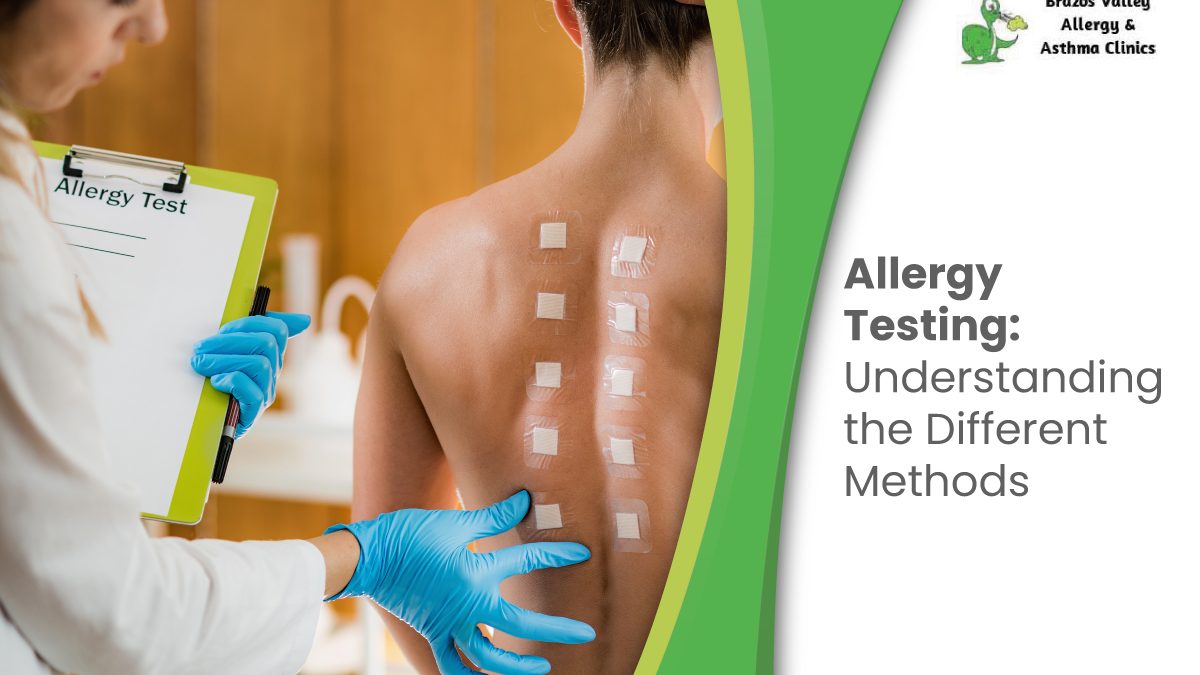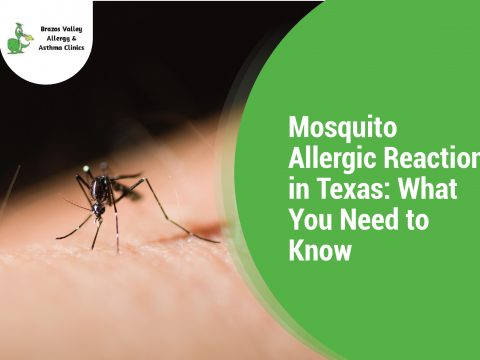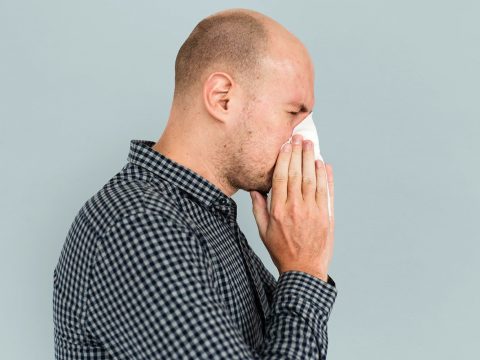- 979-485-9287
- office@bvallergy.com
-
 979-251-7804
979-251-7804
Allergy Testing: Understanding the Different Methods

What to Expect During Venom Desensitization
April 11, 2023
Common Allergies and How to Manage Them
May 3, 2023It is challenging to live with allergies, especially in identifying the triggers. Allergies are common worldwide, affecting anyone regardless of age, gender, and race. An estimated 10% to 30% of the population worldwide struggle with different types of allergies. That is where allergy testing comes in.
Allergy testing is essential to better understand and manage allergies. In this blog, we’ll explore the different allergy testing procedures available and provide information to help you know which option may be right for you. If you want to be one step ahead of your allergies, let’s dive into allergy testing, understanding the different methods.
What Is An Allergy Test?
How does allergy testing work? Allergy testing is a way to determine the substances that cause allergic reactions. These substances, known as allergens, can include pollen, dust mites, mold spores, pet dander, and certain foods. Allergy panel tests can help you identify the triggers and help you avoid exposure to allergens that cause uncomfortable or life-threatening reactions.
Below are the different types of allergy testing that allergists typically recommend. These tests help allergy doctors identify your condition and create the appropriate treatment plan for your needs. How is allergy testing done? Refer to the section below to discover the answers.
What Are The Methods of Allergy Testing?
Several methods are available for allergy testing. These are:
Each method has its strengths and weaknesses, and the choice of testing will depend on the individual’s specific needs.
Skin Tests
An allergy skin test is one of the most common procedures your allergist will suggest if you exhibit allergy symptoms. Skin tests are the most common allergy testing method. An allergy reaction test involves exposing the skin to small amounts of potential allergens. The two most common types of skin tests are:
- The prick test
- The intradermal test
During the prick test, your allergist applies a small amount of the allergen on the skin and pricks it with a needle to determine your allergy type. Moreover, the intradermal test involves injecting a small amount of the suspected allergen under your skin. Both tests are relatively painless and can provide quick results.
Blood Tests
Blood tests are another way to test for allergens. They involve drawing blood and testing it for specific antibodies that indicate an allergic reaction. Blood tests are often used when skin testing is inappropriate. This test is ideal for individuals with severe skin conditions or those taking medication that could interfere with the results. Skin tests typically won’t provide the results during this situation. In such a case, blood testing for allergies proves more efficient.
Elimination Diets
Elimination diets involve removing specific foods or groups of foods from your diet to determine which ones cause an allergic reaction. This method can be time-consuming and challenging. It requires strict adherence to a particular diet for an extended period. However, elimination diets can help identify food allergies, which can be tough to diagnose with other testing methods. According to one study, elimination diets help identify foods that may trigger symptoms such as diarrhea, bloating, gas, and other problems. This procedure will help your allergist determine your allergies or food intolerance. This is the primary reason why elimination diets are better than skin or blood tests in this situation.
Allergy doctors often use these essential allergy testing methods to determine your allergy type. Moreover, these methods provide accurate results, giving your doctors the appropriate information to help you manage your allergies.
Why Is Allergy Testing Important?
It’s important to remember that allergy testing may produce false positive or negative results. Therefore, working closely with an allergist to interpret the results and develop an appropriate treatment plan is essential.
Living with allergies can be challenging. That is why allergy testing plays a crucial role. It can provide valuable information to help you manage your condition. Whether you opt for a skin test, blood test, or elimination diet, working with an allergy doctor can help ensure you receive an accurate diagnosis and effective management plan.
Regardless of the testing method, it’s essential to approach allergy testing with an open mind. With the right approach, allergy testing can be a valuable tool in managing allergies and improving quality of life.
What Are the Benefits of Allergy Testing?
Now that you understand the different allergy testing methods, it is time to discuss the benefits. In this section, you will discover the advantages of getting tested for your allergies. If you want to learn the answer to the question, what is allergy testing good for? You’ll find the answers below.
Identifying the Causes
One of the primary benefits of allergy testing is that it allows you to identify the specific allergens causing your symptoms. Once these allergens have been identified, you can avoid them, significantly reducing your symptoms during accidental exposure and improving your quality of life. Let’s say you are allergic to pollen. You can take steps to avoid exposure to pollen during peak seasons or when pollen counts are high.
Creating the Appropriate Treatment Plan
Allergy testing can also help your allergists develop a treatment and management plan tailored to your needs. For example, suppose you are allergic to a particular food. In that case, you can avoid it or take medication to manage the symptoms. Similarly, your doctor can provide alternative treatment options if you are allergic to a specific medicine.
Identifying the Severity of the Allergic Reaction
Another benefit of allergy testing is that it can help individuals identify their allergies’ severity. It is crucial if you have severe allergies, like anaphylaxis. By determining the severity of your allergies, you can avoid exposure to allergens and carry emergency medication such as an epinephrine auto-injector.
Reducing the Use of Unnecessary Medications
Allergy testing can also help you reduce using unnecessary medications. Many people with allergies take medication to manage their symptoms without knowing the specific allergens causing their reactions. However, once allergens have been identified, you may be able to manage your symptoms without medication by avoiding those allergens.
Providing Peace of Mind
Finally, allergy testing can provide you peace of mind. You can manage your allergies by identifying the specific allergens causing your allergic symptoms and reducing the negative impact on your daily life.
Get Tested and Stay One Step Ahead of Your Allergies
Accurate allergy testing is the key to a better future against allergies. Our board-certified allergists offer the appropriate treatment plan based on your personal needs. You’re on the right page if you’re looking for allergists in Brazos Valley. Our ultramodern allergy testing services are your first step toward an allergy-free life.
You can reach us by clicking this link.




